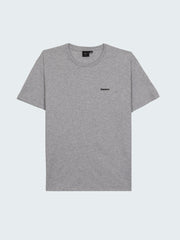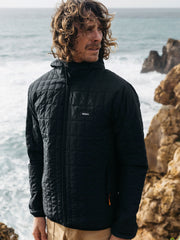A surfer and writer whose work has been featured in the likes of The Surfer's Journal, Pete Geall's latest project, West, is a collection of short stories that pay homage to his home in Cornwall. With proceeds going to the Cornish mental health charity Man Down, we sat down with Pete to discuss the book and his motivations behind the project.
West: A Pete Geall Anthology
19.12.23
4 min read
Words by Pete Geall
Photography by Luke Gartside & Jack Johns
West is a beautiful anthology of some of your surf writing, a “love letter to Cornwall” as you put it. Tell us a little bit about the project and how it came about.
'West' is a collection of ten short stories set amongst the coastline of my home in West Cornwall. Visually it is bought to life by the work of Imogen Allen, Luke Gartside, Jack Johns, Al Mackinnon, Maisie Marshall, and Will Ritson.
In the introduction I describe the Penwith peninsula as a ‘Petri-dish’ of concentrated Cornwall - I find its blend of contradictions and natural beauty endlessly fascinating. Above all, 'West' is a celebration of local surf culture which has bought me so much joy in my life.
The concept for the book was hatched over a pint at the Swordfish in my home of Newlyn, with Cornish publisher James Meredew. By the second beer we already had a working title, a list of contributors we wanted to get involved and an idea of how we wanted to present the work. The paper stock we used for the cover actually has spent brewer’s grain in it, so it’s a kind of nod to that moment of conception.
Every contributor has their own personal connection to the County and I love how that is conveyed through their individual work. My hope is we have produced a modest little book that will serve as a portal to transport people to a clifftop overlooking the roaring Atlantic.
Proceeds from this book go to the Cornish mental health charity Man Down. Why was it so important for you to do that?
‘Man Down’ provide informal peer-support talking groups all over Cornwall for men with mental health concerns. I believe in normalising conversations about mental health and more broadly about what modern masculinity means. It is my sincere hope that my support of this cause can help contribute to that discussion.
During the past year my mental health took a knock when a long-term relationship came to an end. Up until that point I’d lived a fairly charmed life: middle-class upbringing, cruising from one good thing to the next. Without much thought, the persona that I chose to present to the world was one of strength without much space for vulnerability: An athletic lifeguard, fearless surfer or talented writer. It wasn’t until I was confronted by one of the major storms of life that I realised how fragile those constructs were.
Producing this book has been a way of owning that vulnerability and presenting it as a part of me. A part of me that is much more indicative of the kind of masculinity I want to represent than any big wave I’ve ridden. Embodying tolerance, empathy and self-compassion are far higher ideals for us all to strive towards than any physical prowess, I think many blokes struggle with that. I certainly did.
All of us will encounter adversity and mental health challenges at some point in our lives, times where we need support and love more than ever. It’s a uniting quality of human life. Those challenges might not be as immediate or visceral as a looming 15 foot wave about to land on your head – but they are way more scary and more prolonged.
In the same way I work on my physical fitness to stay as healthy as possible, I’ve come to realise its equally important to be attentive to my mental state. Fostering resilience and self-compassion is an essential skill that not only helps when our chips are down but just as importantly, so we can help lift others up when they are facing their own storms.
Looking back on that period I feel indebted to so many of my friends and strangers in the surf community who took it upon themselves to share their own experiences or even just offer some kind words or a hug. As such I’m acutely conscious of the folks out there who through many reasons don’t have a strong support network available to them. The group meetings that ‘Man Down’ facilitate are invaluable to so many and I’m proud to be supporting that effort in this small way.
You’ve travelled extensively to search for waves. What is it about Cornwall that makes it such a special place for surf and the communities that lives here?
I think that specialness is incredibly difficult to define and is, in part, why Cornwall has been a source of creative inspiration for so many. In a way, the stories and artwork in West are a collective attempt to capture that spirit.
My hope through my words is that I’ve been able to present tight vignettes of the Cornish surf experience that really resonate with people. Whether that is the springtime smell of gorse and suncream or the sight of a winter wave contorting itself down the reef at Porthleven in a plume of spit and frothed anger.
The scope of the book is intentionally narrow. By really zero-ing in on the subject of local surf culture we have been able to create a book that is far more expansive than I’d originally envisioned.
The Author, Pete Geall, looking seaward post-surf...
Is there a particular story in the book that you are most proud of, or conjures particularly strong memories for you?
In regards to my personal favourite, I think two stories stand out for me. One details a secluded cove that has become synonymous with social-media fuelled overcrowding during the summer months. The concept of technological change picking at the seams of our shared spaces and identity is a topic that speaks to many people.
The final story ‘A Harbour Affair’ is about my relationship with the surf break at Porthleven and a broader reflection of aging and things coming to pass. It’s a place and community that has given me so much and I feel its an accurate portrayal of the collective dedication of the ‘Cornish Surfer’.
We are a committed bunch, that much I know.





















































































